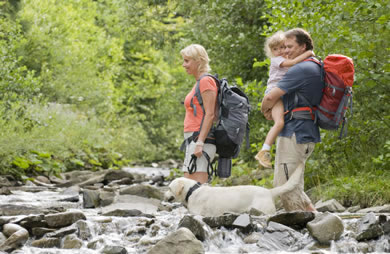|
Ask any runner, or non-runner for that matter, what one of the most common running injuries is and invariably many will mention patellofemoral pain syndrome (PFPS)--AKA runner's knee. It has been reported that as many as 70% of all runners will suffer at least one injury in their running careers, but this should not be a deterrent to anyone who is contemplating taking up running. With proper education and knowledge many people can run without incidence for years. It was once believed that the high impact of running led to a greater incidence of pre-arthritis or osteoarthritis of the knee, but research has revealed that is no longer the case. Runners are at no greater risk than the general population to develop arthritis of the knee. In fact, according to an article published in the October 2007 issue of Runners World running can actually strengthen the connective tissues--ligaments, tendons--and muscles that support the knee, as a result the risk of doing damage to the cartilage, which is the main cause of osteoarthritis, is reduced. But what happens if you develop a wonky knee? Should you embark on a rehab program designed to strengthen the knee or should you err on the side of conservative treatment and allow rest and time to heal? In a recent study published in the October 2009 issue of the British Medical Journal, researchers compared the outcomes of participants with patellofemoral pain syndrome who underwent physical therapy and exercise treatments to other participants suffering as well, but who were instructed to rest. The study participants ranged in age from 14-40 and all had been diagnosed with patellofemoral pain syndrome via their general practitioner or sports medicine doctor. All had to meet at least three criteria for PFPS, such as pain walking up or down stairs, pain upon squatting or running or from sitting for prolonged periods of time with knees flexed. Their symptoms had to have persisted for at least 2 months but no more than 2 years without any other underlying medical conditions such as osteoarthritis or patellar tendinopathy. Researchers assigned some participants to an intervention program where they worked with a physical therapist for 6 weeks to help them develop the muscles-- quadriceps, glutes, and adductors--necessary to support the knee. The study subjects were also given instructions regarding PFPS and at home exercises to help improve knee function. The control group was instructed to rest and avoid physical therapy during the study period, however, they too were given instructions on at home exercises they could do for PFPS. The researchers concluded that those participants who received the supervised physical therapy reported less pain during activity and at rest while experiencing better knee function at 3 months even though they were not completely healed from their injury. After a year, the exercise supervised group still reported less pain than the control group. So what does this actually mean for you if you suffer from runner's knee? Exercise seems to help lessen the pain associated with runner's knee, something I discovered in my own personal journey dealing with issue early on in my own running career. My running coach developed an in depth strength training program consisting of squats, hip adductions exercises and one of the best exercises for runners the single leg squats with toe touch. It is important to note, however, if you are a runner suffering from knee pain, it is imperative that you receive proper diagnosis from your doctor or a sports medicine specialist. Never assume that every pain in the knee is runner's knee. Because the knee is a very complex joint, it is always best to have any prolonged pain checked by your doctor to rule out a more serious medical condition that can be aggravated by running or with exercise. Have you suffered from runner's knee? If so, what measures did you take to resolve the matter? Would the risk of developing runner's knee keep you from taking up the sport of running? |
Popular EntriesRelated Entries
More From SparkPeople
|













.jpg)









